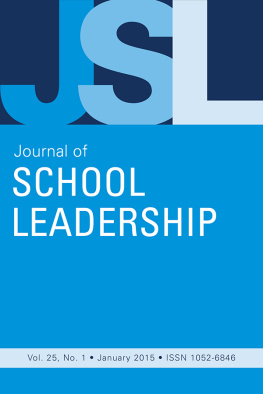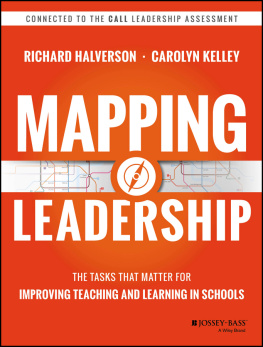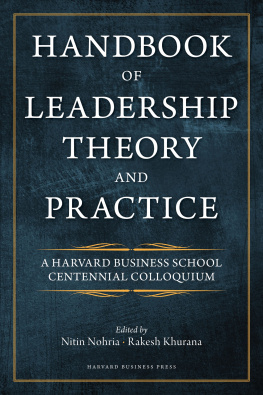Journal of
School
Leadership
EDITORIAL POLICY
The Journal of School Leadership invites the submission of manuscripts that contribute to the exchange of ideas and scholarship about schools and leadership. All theoretical and methodological approaches are welcome. We do not advocate or practice a bias toward any mode of inquiry (e.g., qualitative vs. quantitative, empirical vs. conceptual, discipline based vs. interdisciplinary) and instead operate from the assumption that all careful and methodologically sound research has the potential to contribute to our understanding of school leadership. We strongly encourage authors to consider both the local and the global implications of their work. The journals goal is to clearly communicate with a diverse audience, including school- and university-based educators. The journal embraces a broad conception of school leadership and welcomes manuscripts that reflect the diversity of ways in which this term is understood. The journal is interested not only in manuscripts that focus on administrative leadership in schools and school districts but also in manuscripts that inquire about teacher, student, parent, and community leadership. Additionally, the journal is interested in manuscripts that explore the relationship between leadership and
- teaching, curriculum, and instruction
- student learning, development, and achievement
- whole school renewal and change
- equity, justice, spirituality, and other moral and ethical issues
- social and cultural contexts of schooling
- individual and institutional accountability
- diversity with respect to race, class, gender, gender identity, sexual orientation, ethnicity, and learning styles
- law, finance, and personnel issues in education
- educational policy and politics
- the preservice preparation and in-service professional development of educational leaders
- international and comparative dynamics and issues
- globalization
- libraries and information technology
The Journal of School Leadership is included in the following indexing and abstracting services:
- Academic Abstracts
- Current Index to Journals in Education
- Educational Administration Abstracts
- Education Resources Information Center (ERIC)
PERMISSION TO PHOTOCOPYPOLICY STATEMENT
For copying rights to the articles within this journal, beyond those permitted by Sections 107 and 108 of the U.S. Copyright Law, please contact the Copyright Clearance Center, Inc., 222 Rosewood Drive, Danvers, MA 01923, or by e-mail at .
JOURNAL OF SCHOOL LEADERSHIP (ISSN 1052-6846)published bimonthlyJanuary, March, May, July, September, and November, one volume per year, by Rowman & Littlefield, 4501 Forbes Boulevard, Suite 200, Lanham, MD 20706. Postage paid at Blue Ridge Summit, PA 17214. POSTMASTER: Please send address change to Journal of School Leadership, Subscription Processing Center, 4501 Forbes Boulevard, Suite 200, Lanham, MD 20706.
Call toll-free: 800-273-2223
E-mail:
For back issues, please contact
Subscriptions:
- Annual individual rate $95, $205 per year for institutions.
- Non-U.S. subscriptions, add $60 per year for postage.
- Single-copy price $40 domestic/$48 international.
Copyright 2015 by Rowman & Littlefield. All Rights Reserved.
All Rowman & Littlefield journals are printed on acid-free paper.
Contents
EDITOR
Gatane Jean-Marie, PhD
University of Louisville
College of Education and Human Development
Department of Educational Leadership, Foundations and Human Resource
1905 South First Street
Louisville, KY 40292
E-mail: Office: 502.852.0634Fax: 502.852.4563
ASSOCIATE EDITORS
Curt M. Adams, PhD
University of Oklahoma
Bradley W. Carpenter, PhD
University of Louisville
Sonya Douglass Horsford, EdD
George Mason University
Natalie A. Tran, PhD
California State University, Fullerton
ASSISTANT EDITOR
Kimberly Sanders, Doctoral Student
University of Louisville
MANAGING EDITOR
Carlie Wall
Associate Editor
Rowman & Littlefield
PRODUCTION EDITOR
Emily Natsios
Associate Editor
Rowman & Littlefield
Rowman & Littlefield appreciates the University of Louisville College of Education and Human Development for their support and assistance in the production of the Journal of School Leadership .
EDITORIAL REVIEW BOARD
Thomas Alsbury
Seattle Pacific University, USA
William Black
University of South Florida, USA
Jeffrey S. Brooks
Monash University, Australia
Melanie C. Brooks
University of Idaho, USA
Alan Daly
University of California, San Diego, USA
Gail Furman
Washington State University, USA
Donald G. Hackmann
University of Illinois at UrbanaChampaign, USA
Kristina Hesbol
University of Denver, USA
Jason Immekus
University of Louisville, USA
W. Kyle Ingle
University of Louisville, USA
Lisa A. W. Kensler
Auburn University, USA
Moosung Lee
University of Canberra, Australia
Catherine A. Lugg
Rutgers University, USA
Roxanne Mitchell
University of Alabama, USA
Elizabeth Murakami
Texas A&M University-San Antonio, USA
Anthony Normore
California State University, Dominguez Hills, USA
Bernard Oliver
University of Florida, USA
Izhar Oplatka
Tel Aviv University, Israel
Azadeh Osanloo
New Mexico State University, USA
Craig Peck
University of North Carolina at Greensboro, USA
Augustina Reyes
University of Houston, USA
Chen Schechter
Bar-Ilan University, Israel
Jay Scribner
Old Dominion University, USA
Julie Slayton
University of Southern California, Rossier School of Education, USA
Ekkarin Sungtong
Prince of Songkla University, Pattani Campus, Thailand
Marilyn Tallerico
Binghamton University, State University of New York, USA
George Theoharis
Syracuse University. USA
Mario Torres
Texas A&M University, College Station, USA
Allan Walker
Hong Kong Institute of Education, Hong Kong
Deborah L. West
Eastern Kentucky University, USA
Noelle Witherspoon Arnold
University of MissouriColumbia, USA
Philip Woods
University of Hertfordshire, UK
Adam E. Nir
Lior Hameiri
Coping With Perceived Role Risk as an Expression for School Leaders Accountability
ABSTRACT : Based on literature arguing that risk encourages conservative leadership that supports existing routines and strategies rather than innovations and proactive behaviors, this study focuses on the connection among leadership styles, perceived school productivity, and leaders perceived risk. Results testify to the moderate levels of role risk that school leaders perceive and the relatively high variance existing among these perceptions. Although perceived risk measures are negatively correlated with transformational leadership and positively correlated with transactional and passive leadership, it appears that under conditions characterized by perceived risk, leaders in effective schools are those who act proactively. Such conduct demonstrates high accountability, since risky circumstances increase the potential for mistakes and, therefore, also the threat that individuals experience.
Literature Review
Public schools serve as a prominent example of domesticated and protected organizations (Carlson, Gallaher, Miles, Pellegrin, & Rogers, 1965) operating in a rather stable environment under the sponsorship of the state (Eyal & Inbar, 2003; Mayer & Rowan, 1977). Therefore, it is not surprising that the notion is so prominent stating that public school leaders hardly experience instability or risk on the job in comparison to organizational leaders in other sectors (Inbar, 2000). In reality, however, it appears that this notion may be misleading. Studies confirm that public school leaders consistently define their role as a political one (Blas, 1995; Lindle & Mawhinney, 2003) and are continuously evaluating checks and balances when attempting to succeed in such a turbulent work environment (Lindle & Mawhinney, 2003). In the last couple of decades, schools have been obliged to cope with a dynamic reality characterized by technological innovations, increased social heterogeneity, a variety of needs, competition, and an increasing amount of contradictory expectationsall contributing to the instability and risk shared by school-level educators (Goldring, 1996; Hallinger & Bridges, 1997; Nir, 2003).
Next page







